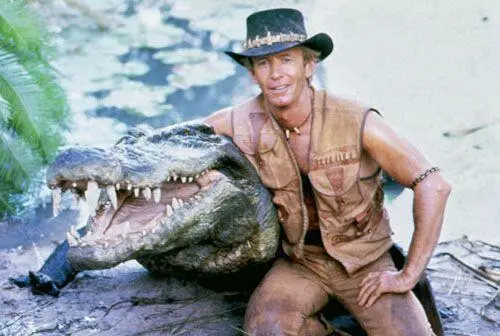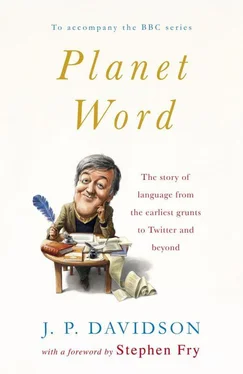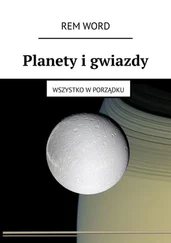Today there are three broad layers of social accents. Cultivated British English, which is spoken by around 10 per cent of the population (think actor Geoffrey Rush); a broad working-class accent (Steve Irwin); and general Australian, spoken by the majority (Kylie Minogue, Russell Crowe).

Paul Hogan in Crocodile Dundee , 1986
There’s some debate about how much of the Australian language derives from the convict immigrants and how much evolved later. The word Pom or Pommie , which the Australians use to describe the English (as in whinging Pommie bastard ) was thought to have derived from POM — Prisoners of Her/His Majesty or Port of Melbourne, where the immigrant ships docked — or from POME — Prisoner of Mother England. Current thinking is that Pommie is a more recent word — as described by D. H. Lawrence in his 1923 novel Kangaroo .
Pommy is supposed to be short for pomegranate. Pomegranate, pronounced invariably pommygranate, is a near enough rhyme to immigrant, in a naturally rhyming country. Furthermore, immigrants are known in their first months, before their blood ‘thins down’, by their round and ruddy cheeks. So we are told.
‘Naturally rhyming country’ is a most apt description, for the Australians love to play with their words: have a Captain’s (look — from Captain James Cook); steak and kidney — Sydney; dead horse — tomato sauce. As with Cockney slang, Americans are septic or seppo . Many of the rhymes are based on popular culture. Grundies and Reginalds are undies or underpants, named after TV mogul Reg Grundy. To do a Harold Holt is to bolt or run away, after the Australian prime minister who disappeared while swimming. If something’s a shocker, i.e. dreadfully bad, it’s a Barry Crocker or simply a Barry (Barry Crocker is a popular Australian singer who sang the original Neighbours theme on TV).
Rhyming slang apart, some of the words and phrases are delightfully visual. Kathy Lette has made her name with her irreverent wordplay.
I think it’s something to do with our Irish heritage, because it’s a love of language, there’s an irreverence there, but it’s often quite loquacious too.’
A beer belly becomes a veranda , sandwiches are a cut lunch , and vomit is a technicolor yawn. As the English reputedly don’t wash, deodorant is Pommie shower , and if something is completely dry it’s as dry as a Pommie’s bath-towel . If you give an Aussie salute , you’re brushing flies away; an ankle biter is a small child; and don’t come the raw prawn means ‘don’t play the fool with me’. Someone who is mentally unbalanced has got candles in their top hat or kangaroos mad in the top paddock . A novice surfer is a shark biscuit , and if something’s in short supply it’s scarce as rocking-horse manure.
And then there’s the unique set of diminutives Australians use — putting ie or o at the end of a shortened word. ‘We shorten everything,’ says Kathy Lette, ‘like cozzie, mozzie, truckie, sickie, quickie. It’s not just because it’s too hot to say the whole word, it’s also because it’s a way of being informal and friendly. It keeps us a bit like children … we haven’t quite grown up.’
Other popular diminutives are arvo — afternoon; smoko — tea break; blowie — blowfly; sunnies — sunglasses; coldie — a beer; snag sanga — sausage sandwich.
The Anglo-Saxon earthiness of the language reflects a deep-seated loathing of pomposity. There’s a story about the Australian media mogul Rupert Murdoch, who was at a dinner party with a self-regarding broadsheet editor. The English editor announced to his fellow diners: ‘I’ve met six British prime ministers, four French presidents, four American presidents and three popes and, do you know, not one of them struck me as having a first-class mind.’ There was a pause around the dinner table, and then Murdoch said, ‘Did it ever occur to you that they probably thought you were a bit of a dick too?’
It seems to be a defining quality of Australians that they can’t let a remark like that go unchallenged. There’s a characteristic which Australians call the Tall Poppy Syndrome — slang for someone with a big ego who needs to be brought back to the level of his peers through put-downs. It can be seen as a reasonable way of keeping inflated egos in check or evidence of an inferiority complex, a desire to punish anyone who sticks their head above the rest and is flamboyant or high-achieving or successful. The instinct to cut people down to size finds its most natural home among Australia’s politicians, whose level of insult hurling can be breathtaking. Mark Latham, when he was leader of the opposition, called Prime Minister John Howard an ‘arselicker’ and described the members of the Liberal Party front bench as a ‘conga line of suckholes’.
The master of the colourful insult was former Prime Minister Paul Keating, whom Kathy Lette describes as ‘having a black belt in tongue-fu’. Nicknamed the Lizard of Oz, he called his opponents, variously, ‘gutless spivs’, ‘foul-mouthed grubs’, ‘painted, perfumed gigolos’ and ‘simply a shiver looking for a spine to run up’. Many of his insults were directed at John Howard, then leader of the opposition, whom he dubbed ‘brain-damaged’, ‘mangy maggot’ and ‘the little desiccated coconut’. It makes Denis Healey’s ‘like being savaged by a dead sheep’ seem quite tame.
Some of the most well known of the Australian euphemisms — the ones that have entered the British English language — flow from the pen of one particular Aussie — satirist and actor Barry Humphries. Humphries, who achieved worldwide fame with his alter ego, Dame Edna Everage, travelled to London in the 1960s and wrote a comic strip for the satirical magazine Private Eye . ‘The Adventures of Barry McKenzie’, illustrated by Nicholas Garland, chronicled the exploits in London of Bazza, an uncouth, loud-mouthed, beer-swilling ‘ocker’. Bazza, writes Humphries, initiated readers ‘into the mysteries of Australian colloquial speech’. He spoke a ‘synthetic Australian compounded of schoolboy, Service, old-fashioned proletarian and even made-up slang’.
In fact, Humphries created so many of his own made-up euphemisms that have entered the vernacular that it’s almost impossible to say what’s invented and what isn’t. Most of the expressions relate to bodily functions and sex. Multicoloured yawn, pointing Percy at the porcelain, siphoning the python, one-eyed trouser snake, dining at the Y, shaking hands with the wife’s best friend, sinking the sausage. Some phrases, like chunder (to vomit) and up shit creek , were dying out until Humphries resurrected them.
Political satirist John Clarke explains: ‘Barry is hugely observant but he’s much more creative than your normal observer. So what he’s done is enriched this series of observations by making the story better than he actually heard. So he’s a Shakespeare, he’s added to the language.’
The comic strip was banned in Australia as, according to Customs and Excise, it ‘relied on indecency for its humour’. Subsequent made-in-Australia feature films based on the book — with Barry ‘Shocker’ Crocker playing the lead — were, however, supported by the Australian government. In fact, the prime minster, Gough Whitlam, made an appearance in the 1974 film Barry McKenzie Holds His Own , where he granted a damehood to McKenzie’s aunt, Edna Everage.
Читать дальше













